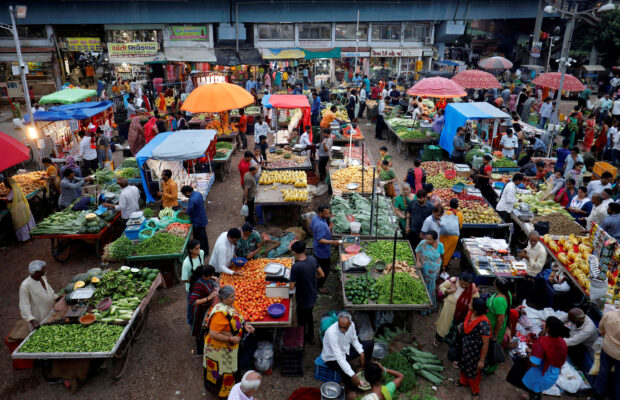India inflation likely cooled to a three-month low in Jan

Customers buy fruits and vegetables at an open air evening market in Ahmedabad, India, Aug 21, 2023. REUTERS/Amit Dave/File Photo
BENGALURU —India’s retail inflation likely eased to a three-month low of 5.09 percent in January on slowing food price rises and favorable base effects, according to economists polled by Reuters who also predicted a moderation in core inflation to 3.7 percent.
The Reserve Bank of India, which held its repo rate at 6.5 percent for a sixth consecutive meeting on Feb. 8, highlighted “large and repetitive food price shocks” as one of the biggest risks to the ongoing disinflation trend.
After surging since November, food prices, which make up about half of the consumer price index (CPI) basket, eased last month, according to economists in the Feb. 5-8 Reuters poll.
READ: India keeps key rate unchanged on strong growth, inflation risks
Headline inflation, as measured by the annual change in the CPI, was forecast to fall to 5.09 percent in January from 5.69 percent in December, the survey of 44 economists showed.
That would still be above the 4 percent mid-point of the central bank’s medium-term target of 2 percent-6 percent.
“We expect inflation in India eased in January on still elevated but falling food price growth,” said Alexandra Hermann, lead economist at Oxford Economics.
“Base effects, softening food price growth, and lower oil prices due to weak market fundamentals should provide further relief to headline inflation in the coming months.”
Core inflation
Inflation will average 5.4 percent this fiscal year and 4.7 percent in the next, a separate Reuters poll showed, close to the RBI’s forecasts of 5.4 percent and 4.5 percent.
Core inflation, which strips out volatile food and energy prices, likely fell further from December’s four-year low of 3.8 percent to 3.7 percent in January, according to the median forecast of 22 economists.
READ: India’s retail inflation hits three-month high in Nov on food prices
The Indian government does not release core inflation figures.
“Core inflation has come down to a comfort zone below 4percentand we believe it is likely to be stable in the near term despite pressures on food inflation, if any,” said Suman Chowdhury, chief economist at Acuite Ratings and Research.
Still, the RBI is expected to leave its key policy rate unchanged until at least end-June before cutting it by 25 basis points in each of the third and fourth quarters, a relatively small move compared with expectations for other global central banks’ easing cycles.